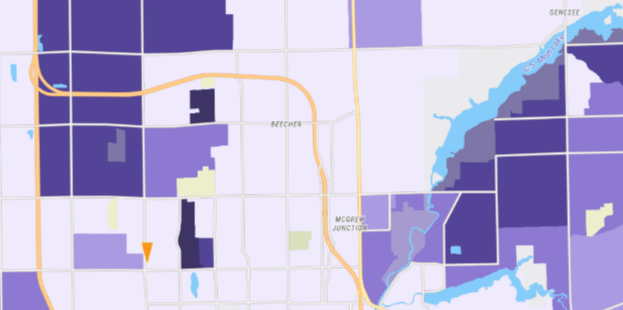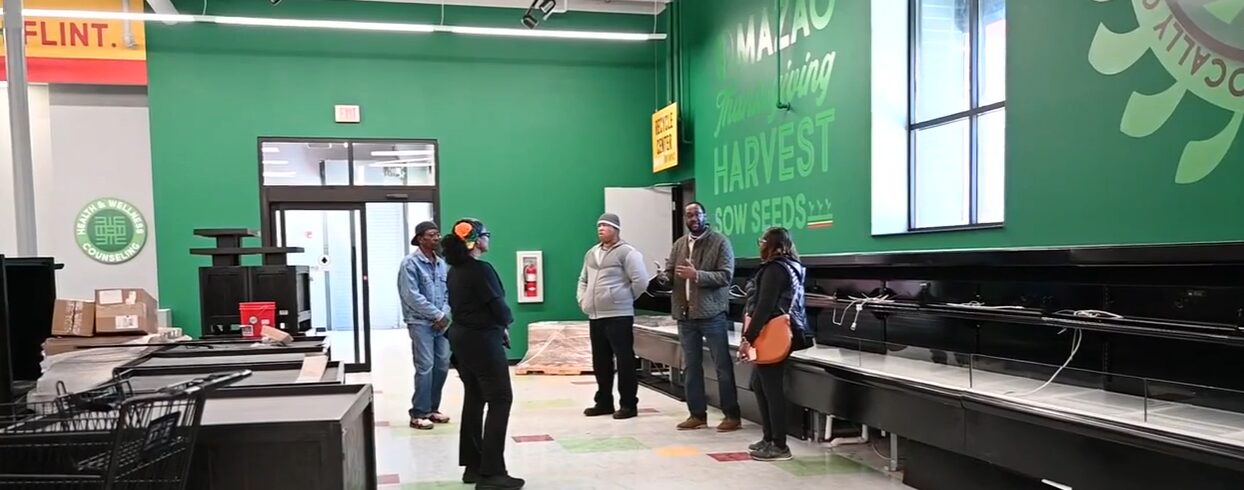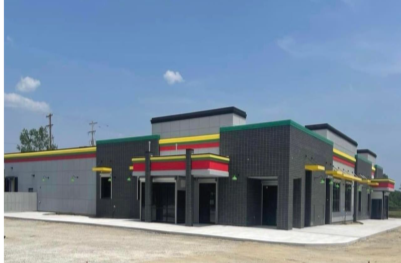Building a Cooperative Food Market in North Flint, Michigan
The 2014 Flint Water Crisis, compounded by the closure of two major grocery stores by 2015, left North Flint residents exposed to dangerous levels of lead and without access to affordable, fresh food. Dollar stores and fast-food chains became the primary food retail sources for residents with low –incomes and limited or no vehicle access. Despite being up against these odds, the Black-led North Flint Reinvestment Corporation convened residents, neighborhood organizations, and other partners to develop what would eventually become North Flint Food Market, a community-owned food co-op with a mission to expand access to healthy food and establish food sovereignty for North Flint.
After the August 2014 closure of Kroger, concerns deepened regarding the impending closure of Meijer, one of north Flint’s last standing grocery stores. The community turned to Pastor Reggie Flynn, Executive Director of the North Flint Reinvestment Corporation and urged him to approach the Chamber of Commerce and the grocery chain’s senior leadership to encourage them to reconsider and stay in the neighborhood. It was clear to Pastor Flynn this was not a viable option, given grocery industry trends that closed stores due to thin profit margins or high crime. A food co-op may not have been the plan at the time, but the communities’ ultimate mission was clear. “We wanted to expand access to healthy food, create more jobs, and own the business enterprise where we shop,” he said.
We wanted to expand access to healthy food, create more jobs, and own the business enterprise where we shop
Pastor Reggie Flynn, Executive Director of the North Flint Reinvestment Corporation
Over the next ten years, North Flint Reinvestment Corporation prioritized community engagement. They held monthly food co-op planning meetings that invited residents to fully participate in its development and design and hold positions of leadership on various committees for membership recruitment, fund development, and marketing. Arlene Wilburn, now the general manager, is local to the North Flint community and has 20 years of experience in grocery retail.
Partnership was key to raising the $7.5M budget for the market – an increase from the initial $5M budget due to rising equipment costs and supply chain delays from the COVID-19 pandemic. Early investment of an $80,000 grant from Capital Impact Partner’s Michigan Good Food Fund supported the initial concept development and the local Chamber of Commerce supported the first business plan—addressing common funding gaps experienced by many early-stage projects.
When it came time to find a site for the market, the Pierson Road Corridor was identified by the City of Flint’s Master Plan as one of the most undersupplied retail markets in Flint. Despite this, the team quickly realized that costs were steep and demand for the corridor’s land was growing.
“The first option was a piece of extremely blighted and abandoned land that required $9M in remediation and new construction. We did not see a way of raising that,” said Pastor Flynn. But a partnership with the local land bank who was interested in North Flint Reinvestment’s larger plans for a multi—phase wellness corridor, helped seal a deal for the purchase of a 1.6-acre parcel which included a 19,000 square foot building and ample space for customer parking.
Additionally, the site is immediately adjacent to a number of areas to the East and North that Reinvestment Fund’s 2023 Limited Supermarket Access Analysis identified as places with severely limited access to grocery stores. In the map below, the darkest shaded areas had the most restricted access to grocery stores in 2022—and the placement of the North Flint Market (the orange triangle) is ideally situated to positively impact residents’ access to fresh foods in North Flint.
Pastor Flynn shared that “the most formidable challenge has been identifying the funding and the financing.” In 2020, North Flint Reinvestment Corporation secured a grant from the Healthy Food Financing Initiative at Reinvestment Fund for $200,000. “HFFI came along at a critical time,” he said. A project like this requires a blend of capital resources. Leveraging catalytic dollars such as HFFI, can help secure additional key financing and close one or multiple financing gaps. For the North Flint Food Market, HFFI funds kick-started the store’s construction and renovation, but it also acted as leverage, helping to secure $547,000 in New Markets Tax Credits (NMTC) and a $845,000 grant from the Michigan Economic Development Corporation (MEDC). “We were able to show other funders that we had a partner in HFFI”, said Pastor Flynn.
North Flint Food Market expects to open in the first quarter of 2024. It exceeded its goal of 1,000 member-owners by opening day. The achievement was, in part, due to its offer of an affordable membership rate at $250 with the option to enroll in a payment plan, putting down as little as ten dollars to gain membership. Early recruitment of members was critical to funding predevelopment expenses like contractual and legal fees for the development of the market’s bylaws, which were needed for their NMTC deal.
The market will include departments for produce, deli, meat, seafood, baked goods, and dairy. The market will hire staff from within the community and expects to create 15 full-time and 23 part-time positions. A partnership with Michigan State University’s Center for Regional Food Systems will assist the market in achieving its goal of sourcing 10 percent of its produce from local farmers in its first year and increasing this percentage over time.
For North Flint Food Market stakeholders, bringing affordable fresh food back to North Flint is just a starting point. The long-term vision for this project is a multi-phase development of a health and wellness corridor allowing residents to continue rebuilding a community of their own. As a city that is no stranger to an exodus of capital and investment, Pastor Flynn believes there is hope that North Flint Food Market’s framework can be a blueprint for similar communities ready to pave their own way. “This project is not only important to Flint but is also possibly a national model to replicate in other areas. That’s a goal.”



